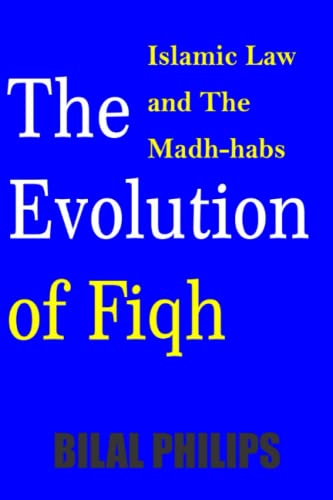The Evolution of Fiqh (Islamic Law & The Madh-habs)
Bilal Philips
BOOK REVIEW

The Evolution of Fiqh (Islamic Law & The Madh-habs), penned by Bilal Philips, is not merely a book; it's an electrifying journey through the complex tapestry of Islamic jurisprudence. From the thriving centers of knowledge in the medieval Islamic world to the pivotal debates that shape modern Islamic law, this work serves as a compelling exploration that ignites curiosity, challenges assumptions, and thus, compels us to rethink the very essence of law in Islam.
At the heart of Philips' narrative lies a dynamic exploration of the Madh-habs, the various schools of thought that have arisen in Islamic jurisprudence. Dr. Bilal Philips, a prominent Islamic scholar, immerses the reader into the rich historical context of these schools, revealing how diverse interpretations have contributed not just to religious identity, but also to cultural nuance in Muslim societies. With each page, you begin to realize the weight of decisions made centuries ago and their lingering impact on today's Islamic communities.
What makes this work particularly riveting is Philips' ability to present complex legal theories with clarity and accessibility. He doesn't just offer dry facts but engages you with real-life implications of these legal frameworks. For instance, he discusses how the evolution of fiqh isn't simply an academic exercise; it impacts the daily lives of millions, from personal matters like marriage and divorce to societal structures. Herein lies a core truth: understanding Islamic law offers insights into the values and principles that govern a significant portion of the world's population.
Readers have reacted strongly to The Evolution of Fiqh. Some laud Philips for his comprehensive approach that marries historical accuracy with contemporary relevance, while others may critique the work for perceived biases toward certain schools of thought. Such divergences in opinion reveal a critical fact-this book is provocative and timely. Its discussions on gender roles within Islamic law, the interpretation of religious texts, and the responses to modernity spark debates that are necessary in our ever-evolving world.
The backdrop of this scholarly endeavor is no less significant. Written in a time of increasing polarization, where misconceptions about Islam abound, Philips' work stands as a beacon of nuanced understanding. He deftly navigate the often tumultuous waters of Islamic jurisprudence, advocating for a balance between tradition and modernity-a stance that resonates deeply in our age of disparity and discord.
Philips is not just a voice; he is part of a global conversation that includes scholars like Tariq Ramadan and Khaled Abou El Fadl, whose work emphasizes reform and reinterpretation within Islamic thought. The intersections of their ideas with those presented in The Evolution of Fiqh illustrate a broader dialogue about the future of Islamic law and its role in a globalized world.
This book compels you to confront the pressing question: How do we reconcile rigid legal frameworks with the fluidity of contemporary life? It's a question that challenges every reader to peel back layers of entrenched beliefs. You might find yourself wrestling with your own perceptions of justice, morality, and cultural identity long after you put it down.
As you delve into this text, envision futures where understanding breeds acceptance and where law serves humanity rather than confines it. Philips doesn't just provide answers; he incites you to question the status quo and see the world through a lens colored by historical depth and cultural empathy.
In a world that often reduces complex issues to polarizing dichotomies, The Evolution of Fiqh dares you to explore the grey areas. The intricate web of Islamic law becomes a mirror reflecting our own societal struggles with justice, interpretation, and the myriad ways we seek to balance our values with a changing world.
In conclusion, reading Bilal Philips' work is not merely an academic exercise; it's an invitation-to interrogate, to engage, and ultimately, to evolve. The implications of understanding Islamic law extend far beyond academia; they seep into the fabric of society itself. So, as you navigate your reading journey, remember: the understanding you gain could very well shape the conversations of tomorrow.
📖 The Evolution of Fiqh (Islamic Law & The Madh-habs)
✍ by Bilal Philips
🧾 144 pages
2022
#evolution #fiqh #islamic #madh #habs #bilal #philips #BilalPhilips